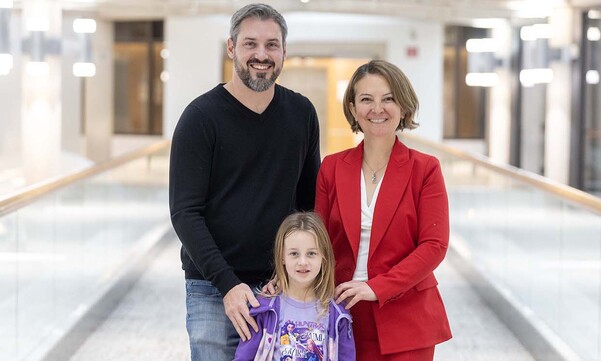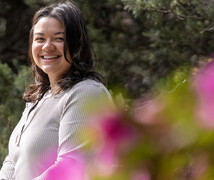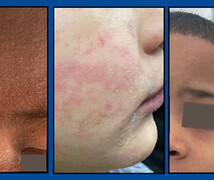After a year battling recurrent ear infections in her child, Chris Fellows turned to Duke for a second opinion. Experts diagnosed her son, Grant, with a rare immune disorder, and recommended a treatment that would keep him free of infection. “Duke turned a scary situation into something manageable,” she says. “We’re lucky we live close by.”
Struggling to Find a Diagnosis
Grant Fellows of Raleigh was five years old when he developed recurrent ear and sinus infections. “For an entire year, he was on and off antibiotics. Every six weeks, there was a new infection,” says his mom, Chris.
A specialist put tubes in Grant’s ears, but the infection came back. “Something didn’t seem right, so we decided to go to Duke for a second opinion,” says Chris. They made an appointment with Duke otolaryngologist Matthew Ellison, MD. “We hoped he would see something the other doctors didn’t,” says Chris.
Ellison ran a series of tests to look for, among other things, potential allergies and immune deficiencies. Finally, they had an answer. “It was one of those bittersweet moments,” says Chris. “It was good to have an answer, but then we realized what we were dealing with.”Grant was diagnosed with common variable immunodeficiency (CVID), an immune disorder that leaves him vulnerable to infection, and increases his risk for serious diseases like cancer. “It was scary,” says Chris. “He’ll have this chronic condition his whole life unless they find a cure to jumpstart his immune system.”
Receiving Treatment at Duke
The Fellows were referred to immunology specialists at Duke Children’s Consultative Services in Raleigh. They recommended a treatment that would keep Grant infection-free. Unfortunately, it wasn’t as easy as taking a pill or getting a shot. Grant needed monthly infusions to build up his immune system. “His body doesn’t produce natural antibodies, so it’s like an empty gas tank. These treatments fill him up,” says Chris.
Grant was seven when he started the treatment. He was old enough to understand what was coming, and young enough to be fearful of the experience. “It was pretty awful,” says Chris. “He would say, ‘please don’t poke me’. It was so hard to make him do it. But the nurses were awesome. They had fun things to distract him like arts and crafts and Wii games.”
"The needles scared me but the nurses helped me get over my fears,” says Grant. “They played games with me and they were great."
Although the treatments seemed to be working, Grant began experiencing severe headaches as a side effect. After three years of monthly infusions, the Fellows changed to a treatment they could give Grant at home. The medication is still given intravenously, but in a smaller dose, and weekly instead of monthly. It has helped reduce his headaches.
“I was scared of poking my kid with a needle,” says Chris. “But Duke sent nurses to train us and monitor us. It’s worked out great.”
A Manageable Future
Now in middle school, 11-year-old Grant has remained infection-free. Despite the risks of exposure to illnesses, Chris says they keep things as normal as possible.
“The temptation was there in the beginning to put him in a bubble, but we learned to just be more cautious. We have a plan in place with the school to notify us if something serious breaks out. But he goes to public school, he rides the bus, swims and plays hockey. He’s just an all around great kid.”
“Duke turned a scary situation into something manageable,” she adds. “We’re lucky we live close by.”





